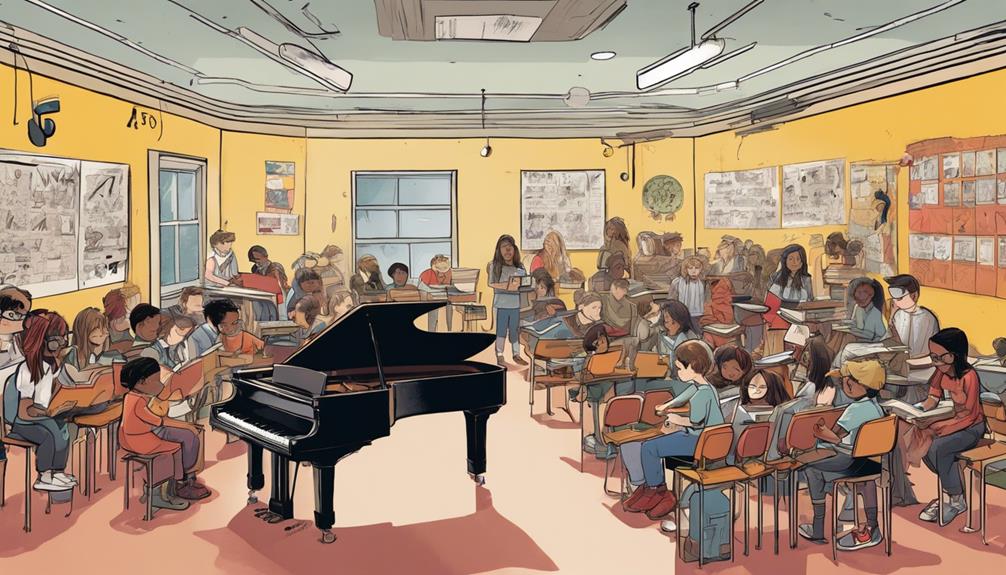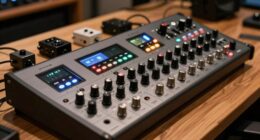To gain admission to music school, you'll need to demonstrate a strong passion for music, a commitment to intensive training, and a clear understanding of the competitive landscape. Start by evaluating your readiness for music school, gauging your passion, dedication, and musical skills. Research different types of music schools, exploring performance-based schools, music programs, and admission requirements. Prepare for auditions by fine-tuning your skills, managing nerves, and showcasing your abilities effectively. Craft a strong application, including a well-written personal statement, and navigate the live audition process. By understanding the process and preparing thoroughly, you'll increase your chances of getting into the right music program for you – and that's just the beginning.
Key Takeaways
- Assess your passion, dedication, and musical skills to determine if music school is right for you.
- Research different types of music schools, including performance-based schools, to find the best fit.
- Identify specific admission requirements, including audition and academic prerequisites, for each target school.
- Develop a strong application package, including a winning pre-screen recording and a well-written personal statement.
- Prioritize schools based on faculty expertise, performance opportunities, and location, and tailor your application to each school's unique strengths.
Should You Apply to Music School?
Before diving into the application process, take a step back to honestly assess whether music school is right for you. Consider your passion for music and dedication to pursuing a career in the field. Are you willing to commit to intensive training and put in the hard work required to succeed? Evaluate your musical skills, aspirations, and willingness to take on the challenges that come with music school.
Researching music schools can help you find the right fit for your goals and abilities. Look into the specific requirements, deadlines, and audition processes of different schools to determine if you're ready to apply. Seek guidance from music educators, mentors, and professionals to get an honest assessment of your readiness for music school. They can help you identify areas for improvement and provide valuable insights into what to expect.
Reflect on your long-term goals, career prospects, and personal growth opportunities. Will music school align with your aspirations and help you achieve your goals? Take the time to carefully consider these questions before deciding to apply. By doing so, you'll be able to make an informed decision and set yourself up for success in the world of music.
Types of Music Schools

As you explore music school options, you'll encounter three main types: music departments, schools of music, and conservatories. Each type offers a distinct approach to music education, and understanding their differences is essential in finding the best fit for your goals.
You'll want to contemplate whether a performance-based school or an academic music program aligns with your aspirations, so let's break down what each type has to offer.
Performance-Based Schools
If you're serious about becoming a professional musician, you'll want to explore performance-based schools, which offer intensive training and a highly competitive environment to hone your skills.
At music school, you'll focus primarily on performance and receive rigorous training in your instrument or voice, as well as music theory, history, and ensemble participation.
The audition requirements are often stringent, and you'll need to demonstrate high technical proficiency and musical expression to get in.
Once you're in, be prepared to put in the work – the environment is highly competitive, with a strong emphasis on individual practice and performance opportunities.
This type of music school is ideal for those who want to pursue careers as professional musicians, soloists, ensemble members, or music educators.
Academic Music Programs
You'll find that music departments, schools of music, and conservatories offer distinct academic music programs, each with its own unique characteristics and benefits. When researching music schools, it is crucial to understand the differences between these institutions to make an informed decision about your music education.
Here's a breakdown of the three types of music schools:
| Type of Music School | Focus | Admission Requirements | Degree Options |
|---|---|---|---|
| Music Department | In-depth music programs within larger universities | Varied, often aligned with university requirements | Bachelor's, Master's, Doctoral |
| School of Music | In-depth music programs within larger universities | Competitive, with a focus on music proficiency | Bachelor's, Master's, Doctoral |
| Conservatory | Specialized music education and performance | Highly competitive, with a focus on exceptional performance skills | Bachelor's, Master's, Certificates |
A School of Music, for example, typically offers an in-depth music program within a larger university, providing a well-rounded education in music theory, history, and performance. Conversely, a conservatory focuses solely on music education and performance, often with more rigorous training and admission requirements. Considering these differences will help you choose the right music school for your goals and aspirations.
Building Your School List

As you start building your school list, you'll want to research music programs that align with your interests, career goals, and desired location.
You'll need to identify the admission requirements for each school, including auditions, portfolios, and academic prerequisites.
Research Music Programs
Now that you've identified your goals, it's time to research music programs and build a list of schools that align with your aspirations. This essential step will help you find the perfect fit for your music education.
You'll want to explore the specific music disciplines offered by each school, such as performance, composition, music education, or music therapy, to find the best fit for your interests. Additionally, consider the faculty’s expertise and the opportunities available for hands-on learning, such as ensembles, internships, or community outreach programs. Research the school’s facilities, such as performance halls and practice spaces, as these can greatly enhance your learning experience. Understanding these factors is essential when determining how to choose a music school that aligns with your goals and aspirations.
Here are three key factors to keep in mind when researching music programs:
- Faculty expertise: Look for schools with faculty members who are renowned in their field and have a track record of producing successful alumni.
- Facilities and resources: Consider the quality of facilities, such as concert halls, recording studios, and practice spaces, as well as access to industry-standard software and equipment.
- Location and opportunities: Think about the location of each school and the opportunities it provides for performances, collaborations, internships, and networking in the music industry.
Identify Admission Requirements
With your list of music schools in hand, it's time to explore deeper into the admission requirements for each program to make certain you meet the eligibility criteria. This important step will help you tailor your applications effectively and avoid any last-minute surprises.
| School | Audition Requirements | Academic Requirements |
|---|---|---|
| Juilliard | Piano concerto, sonata, and etude | 3.5 GPA, SAT/ACT scores |
| Berklee | Original composition, improvisation | 3.0 GPA, music theory exam |
| NYU | Classical piece, jazz standard | 3.2 GPA, letters of rec. |
As you research each school's admission requirements, consider factors like prescreening recordings, letters of recommendation, and personal statements. Additionally, look into any extra requirements, such as theory exams, interviews, or instrument proficiency tests. By developing a thorough understanding of each school's admission process, you'll be well-prepared to submit a strong application. Remember, meeting the admission requirements is just the first step – you'll also need to showcase your musical talent and passion through your application materials.
Prioritize School Opportunities
You've got a list of music schools that align with your goals, interests, and aspirations, but it's time to prioritize them based on what matters most to you. This is an essential step in the application process, as it will help you focus your energy on the schools that are the best fit for you.
When building your school list, consider the following key factors:
- Faculty expertise: Are the instructors experienced in your area of interest?
- Performance opportunities: Will you have access to regular performances, recitals, and concerts?
- Location: Would you thrive in an urban, suburban, or rural setting?
Preparing for Auditions

As the audition date approaches, it's essential to fine-tune your preparation in order to guarantee a standout performance. To tackle the audition process effectively, you'll need to practice consistently, focusing on your audition repertoire and techniques. Seek feedback from teachers, mentors, and peers to refine your performances and presentation.
Research the specific audition requirements of each music school to tailor your preparation accordingly. This will help you understand what to expect and prepare you for the audition process.
Developing a routine for managing nerves and stress during auditions is also important. You can't afford to let anxiety get the best of you on the big day. Utilize resources like online forums, masterclasses, and mock auditions to enhance your audition preparation. These will help you fine-tune your skills, build confidence, and get comfortable with the audition process.
Recording a Winning Pre-Screen

To maximize your chances of standing out in a crowded applicant pool, it's crucial to submit a high-quality pre-screening recording that showcases your skills and artistry. As a music student, you want to make a strong impression on the admission committee, and a well-recorded pre-screen can make all the difference.
To achieve this, practice well in advance to guarantee preparedness and confidence. Select a quiet space with good acoustics and proper lighting to enhance the quality of your performance. Avoid over-editing your recording, as this can detract from the authenticity of your playing.
Here are three key takeaways to keep in mind:
- Follow the guidelines: Each music school has specific requirements for pre-screening recordings, so make sure to adhere to their guidelines carefully.
- Seek feedback: Get feedback from teachers or mentors on your recording to identify areas for improvement.
- Keep it authentic: Ensure that your playing is showcased accurately and authentically, without excessive editing or manipulation.
The Live Audition Process

Sixteen weeks after submitting your pre-screening recording, you'll receive an invitation to attend a live audition, where you'll perform in person for the admission committee. This important step in the music school application process allows the committee to assess your musical abilities up close.
During the live audition, you'll typically perform prepared pieces on your instrument or voice, showcasing your technical skills and musical interpretation. This is your opportunity to demonstrate your stage presence, musicality, and overall preparedness for music school.
The repertoire requirements for live auditions vary by school and instrument, so be sure to review the specific guidelines on pieces and styles to be performed. It's imperative to prepare diligently for the live audition, ensuring you showcase your unique musical abilities and make a lasting impression on the audition committee.
Navigating Applications and Essays

With your live audition preparation underway, you'll simultaneously need to tackle the written components of your music school applications, particularly the essays, which can make or break your chances of standing out in a competitive applicant pool. A well-crafted personal statement is essential to convey your passion for music and career goals.
To guarantee your essays are effective, remember the following key points:
- Showcase your uniqueness: Highlight your distinctive experiences, achievements, and aspirations to differentiate yourself from other applicants.
- Demonstrate professionalism: Make sure your essays are well-written, cohesive, and error-free to showcase your commitment to your music education.
- Follow application requirements: Adhere to word limits and specific essay prompts provided by each school to meet application requirements accurately.
Seeking feedback from mentors, teachers, or counselors on your essays can help refine your writing and make a strong impression on admissions committees. By focusing on these essential aspects of the application process, you'll increase your chances of success in the competitive music school admissions landscape.
Finding the Right Music Program

As you weigh your options, consider what aspects of a music program will help you achieve your personal goals and aspirations. This is important in finding the right fit for you.
Look for music schools that offer the specific music discipline you want to study, whether it's classical, jazz, or music production. Research the faculty and instructors at each music program to make sure they align with your goals. You want to learn from professionals who've experience in your desired field.
Explore the performance opportunities and collaborations available at different music schools. Will you have chances to perform solo or with ensembles? Are there opportunities to collaborate with other musicians or even composers?
Evaluate the location, facilities, and overall environment of each music program. Consider the resources available, such as practice rooms, recording studios, and libraries. Think about the size of the program and the student-to-faculty ratio.
Frequently Asked Questions
Is It Hard to Get Into Music School?
Yeah, getting into music school can be tough for you It's super competitive, with acceptance rates as low as 5-10% at some schools, so you'll need to bring your A-game with a killer audition and strong app.
What Is the Most Competitive Music School?
You're wondering what the most competitive music school is? Well, it's a tie between Juilliard, Curtis Institute of Music, and New England Conservatory, with acceptance rates as low as 3-5%
How Hard Is It to Get Into Eastman School of Music?
You face stiff competition, with only 13% of applicants accepted into Eastman School of Music. To stand out, you'll need to showcase exceptional musical talent and proficiency through rigorous auditions and meet lofty academic standards.
How Hard Is It to Get Into Yale School of Music?
Getting into Yale School of Music is extremely tough, with an 11% acceptance rate. You'll need to showcase exceptional musical talent, academic achievement, and industry potential through auditions, interviews, and recommendations.
Conclusion
As you submit your applications, coincidentally, you'll find yourself reflecting on the journey that brought you to this moment.
The countless hours of practice, the sweaty palms before performances, and the unwavering passion that drove you to pursue music.
It's a reminder that getting into music school isn't just about acceptance; it's about the growth, dedication, and perseverance that define you as a musician.










